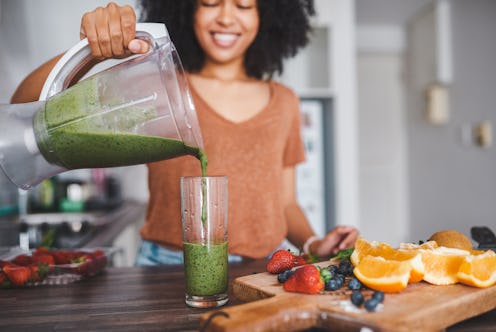Life
What Nutritionists Want You To Know *Before* You Go Plant-Based

Making a big change — like learning to tango, moving to a new city, or going plant-based — can be exciting. If you've decided to go vegetarian, you may be raring to go, prepared to reject all bacon-based dishes forever and embrace a plant-based lifestyle. But a sudden about-face can stress out your body, not to mention be unsustainable in the long-term. We asked nutritionists for their best tips for going vegetarian so that you can make it work.
As anybody who's spent time in college dorms will know, being vegetarian doesn't guarantee someone is getting all their nutrients. It's perfectly possible to be vegetarian and live solely on doughnuts and potato chips for six months, with the occasional lemonade to avoid scurvy. (Yes, I know somebody who did this.) To make sure that you're fueling your body in the most effective ways, experts tell Bustle, it's a good idea to know a little about how proteins and other food sources contribute to your health — and to plan your vegetarianism as a process that will turn into a lasting lifestyle, rather than a whim.
Here's the best advice from nutritionists for changing to a vegetarian diet. Some of their guidelines might surprise you.
1Take Your Time
Going full-pelt into vegetarianism can seem tempting, but it may be easier on your system and your meal planning if you do it a little more slowly. "Take it one step at a time," Rachel Fine, R.D. C.D.N, a registered nutritionist, tells Bustle. "Instead of aiming for a complete switch in your eating routine, consider picking one, two, or even three days a week to be vegetarian."
If this is too much for you, or proves to be logistically difficult, an alternate approach is to focus on one meal at a time. Registered dietician and nutritionist Kristen Carli R.D. tells Bustle, "When becoming a vegetarian, it is sometimes best to transition slowly, by incorporating a few meatless meals into your week, before transitioning 100%." Gradually changing your eating over time may be more sustainable than making a big leap all of a sudden.
2Replace Protein With Protein
If you're transitioning to vegetarianism, it's a good idea to make sure that your protein levels remain the same once you've cut out meat. "One of the most common issues I see in my practice is patients removing the meat from their plate without replacing it with plant-based sources of protein," Carli tells Bustle.
We need protein in order to build muscle fiber and other tissue. "Out of the 20 amino acids, there are nine that the body cannot make on its own, making it essential that they are consumed through the diet," nutritionist Lisa Richards C.N.C. tells Bustle. Many of us get those nine amino acids from meat products, but legumes, nuts, seeds, chickpeas, peanut butter, cashews, and eggs and dairy are good meatless protein options.
If you see something labeled as a complete protein, it means it contains all nine amino acids, and is a great option for a protein source. Quinoa, amaranth, hemp, soy, and chia are all complete proteins.
3Pay Attention To Your Nutritional Needs
A vegetarian diet can be a big change, so it's important that you're mindful you're getting the right nutrition. “Transitioning to a vegetarian diet is best done with adequate education on how to fulfill your protein and vitamin needs," Richards tells Bustle.
One common issue, Carli says, is that new vegetarians can rely on refined carbohydrates like mac and cheese or pizza because they're "easier" vegetarian options. These might be tasty, but they may not give you enough nutrition to support your body. Variety can be really helpful for your gut, so make sure you look out for a range of whole grains and legumes to fuel your need for carbs. Holistic health expert Jessica Rosen also advises eating a variety of different nuts, seeds, legumes, and leafy greens. "These foods can help meet your calcium and iron needs when removing animal products from your diet," she tells Bustle. And it's a chance to find something new and exciting in the vegetable section.
4Examine Your Motivations
Committing to eating "healthy" can backfire because it creates prohibitive rules, experts tell Bustle. "Any restriction placed on your eating habits risks the development of unsustainable 'rules' long term," Fine tells Bustle Embracing rules about what you should and shouldn't eat, she says, can lead to punishing thoughts about food, particularly if your new diet leaves you feeling hungry or undernourished.
Look at your motivations for being vegetarian carefully, she says. "Instead of fully avoiding any one type of food, consider making decisions and choices around how certain foods make you feel physically, emotionally, and in this case, ethically."
5Consider Supplements
If you haven't quite figured out how to meet your nutritional needs in every way on your exciting new vegetarian diet, supplements can help. B12 is one nutrient that's hard for vegetarians to get enough of — and it's necessary to keep your blood cells and nerve cells in top condition. "It is only available naturally through animal sources and is essential to many body functions and overall health," Richards says.
When you're changing your diet, it's a good idea to talk to your doctor about what supplements to take rather than just raiding the health-foods aisle. Too much of some nutrients can be harmful, so it's often helpful to get professional advice before you buy any.
6
Becoming a vegetarian can be a wild ride. If you follow some expert advice, though, there are ways to do it that make sure you're getting enough nutrition, and aren't leaving a lot of optimistically bought eggplant rotting in the fridge.
This article was originally published on